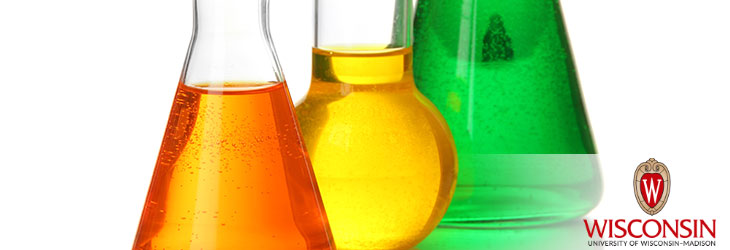Materials & Chemicals

Modified Microbes Tolerate 50-Fold More Organic Acid
WARF: P120017US02
Inventors: Brian Pfleger, Matthew Begemann
The Wisconsin Alumni Research Foundation (WARF) is seeking commercial partners interested in developing cyanobacteria genetically modified to tolerate high yields of building block chemicals like 3HP.
Overview
Production of industrial chemicals has long relied on petroleum-based starting material. As reserves of fossil carbon dwindle, a new approach is looking to microorganisms and their ability to convert renewable sources into valuable chemicals.
The U.S. Department of Energy (DOE) recently targeted several ‘building block’ chemicals that could be produced from renewable resources. One such target is 3HP (3-hydroxypropionic acid), which readily is transformed into commodity chemicals like acrylic acid. These chemicals represent a multibillion dollar industry.
Problematically, 3HP and many other industrial chemicals actually are toxic to the microbes that produce them. This has constrained output. It is critically important to develop chemically tolerant strains capable of industrial-scale yields.
The U.S. Department of Energy (DOE) recently targeted several ‘building block’ chemicals that could be produced from renewable resources. One such target is 3HP (3-hydroxypropionic acid), which readily is transformed into commodity chemicals like acrylic acid. These chemicals represent a multibillion dollar industry.
Problematically, 3HP and many other industrial chemicals actually are toxic to the microbes that produce them. This has constrained output. It is critically important to develop chemically tolerant strains capable of industrial-scale yields.
The Invention
UW–Madison researchers have genetically modified microorganisms to better tolerate organic acids like 3HP, acrylic acid and propionic acid. The modified microorganisms are cyanobacteria such as Synechococcus.
In the modified bacteria, the acsA gene is replaced or deleted. This leads to increased organic acid tolerance.
In the modified bacteria, the acsA gene is replaced or deleted. This leads to increased organic acid tolerance.
Applications
- Industrial bioproduction of chemicals, including 3HP and acrylic acid
Key Benefits
- Huge improvement in organic acid tolerance
- Outperforms other modified strains
Stage of Development
The modified cyanobacteria have shown 50-fold improvement in organic chemical tolerance, growing at 50g/L of 3HP.
Additional Information
For More Information About the Inventors
Related Technologies
Related Intellectual Property
For current licensing status, please contact Jennifer Gottwald at [javascript protected email address] or 608-960-9854